
Over three years of planning and building their sustainable and innovative house came to a conclusion for Team VIRTUe at the Solar Decathlon Middle East 2018 award ceremony in Dubai. Ending in 6th position overall, this was an impressive result for the students from the Eindhoven University of Technology who were new to this competition and had to compete against more experienced teams. The team did especially well on both communication and sustainable transportation, taking home 2nd place.
The final result was uncertain right up until the last day since the acquired points shifted every hour. The final award ceremony was tantalizing in itself due to miscalculations from the organization. Team VIRTUe appeared to have been awarded 2nd place for house functioning, but after some protests from other team captains, the result was recalculated and the award went to Team Sapienza from Italy.

The Solar Decathlon is an international design competition during which student teams build their own designed innovative, sustainable houses that are then judged by ten different aspects, like architecture, energy efficiency and comfort. In this 2018 edition in Dubai, 50 teams started the competition, of which only 15 teams managed to build and complete a house.
The team VIRTUe house, called LINQ, is intended to be used in existing neighbourhoods and is full of innovative gadgets. The house not only reduces energy consumption without affecting the comfort of the occupants but also focuses on the social sustainability of the neighbourhood in which the apartment is located. Through its shape, LINQ promotes social interaction, for example through shared spaces and a vertically planted atrium.
Dutch treats
The last two weeks of the competition were a strenuous time for the team with public tours every day, house measurements being taken for comfort and water and energy usage, washing and drying towels and sustainable driving – all part of the competition. The performance of LINQ was monitored closely by both the organizers as well as the team. Every day there were early shifts starting at 7 am until the late shifts at 8 pm. Five jury tours took place with an expert jury visiting the houses asking many critical questions, putting the students and their innovations to the test.
Three dinners had to be prepared for competing teams, which also had to be judged. VIRTUe opted for a vegetarian, sustainable dinner with some typical Dutch treats like ‘pepernoten’ and ‘stroopwafels’ for dessert. The dinners turned out to be an effective way to get to know the other teams. The Dutch bicycles and our solar powered car Stella Lux, which both showed VIRTUe’s full vision of a future living, were also very popular with the other teams and the visitors. Overall, the team looks back at a wonderful experience upon which the next VIRTUe team can build.
Smart mirrors in the bathroom
The appearance of solar car Stella Lux gave the team a lot of points. Photo: Team VIRTUe.
The teams that took the top positions in the general classification were all much more experienced than newcomer VIRTUe, like team Virginia Tech (USA) (1st prize), UOW (Australia) (2nd prize) and Team BaityKool (Fra, UAE and Palestine) (3rd prize). Those teams proved to be fierce competitors with their innovative houses. Interestingly, each team had opted for a specific focus. VIRTUe aimed its house at expats, UOW at the elderly (disabled) and BaityKool had co-living as a central theme.
All the teams showcased innovative solutions for a sustainable lifestyle, varying from using worms to clean water for recycling, green vertical walls to cool the air or size-adaptable spaces, for example by having walls on wheels or moving upper floors on a slider. Other innovations were the incorporation of self-learning systems to optimize the house to the occupants’ needs or smart mirrors in the bathroom showing the weather forecast, your calendar and the news.
Source: TU/e








